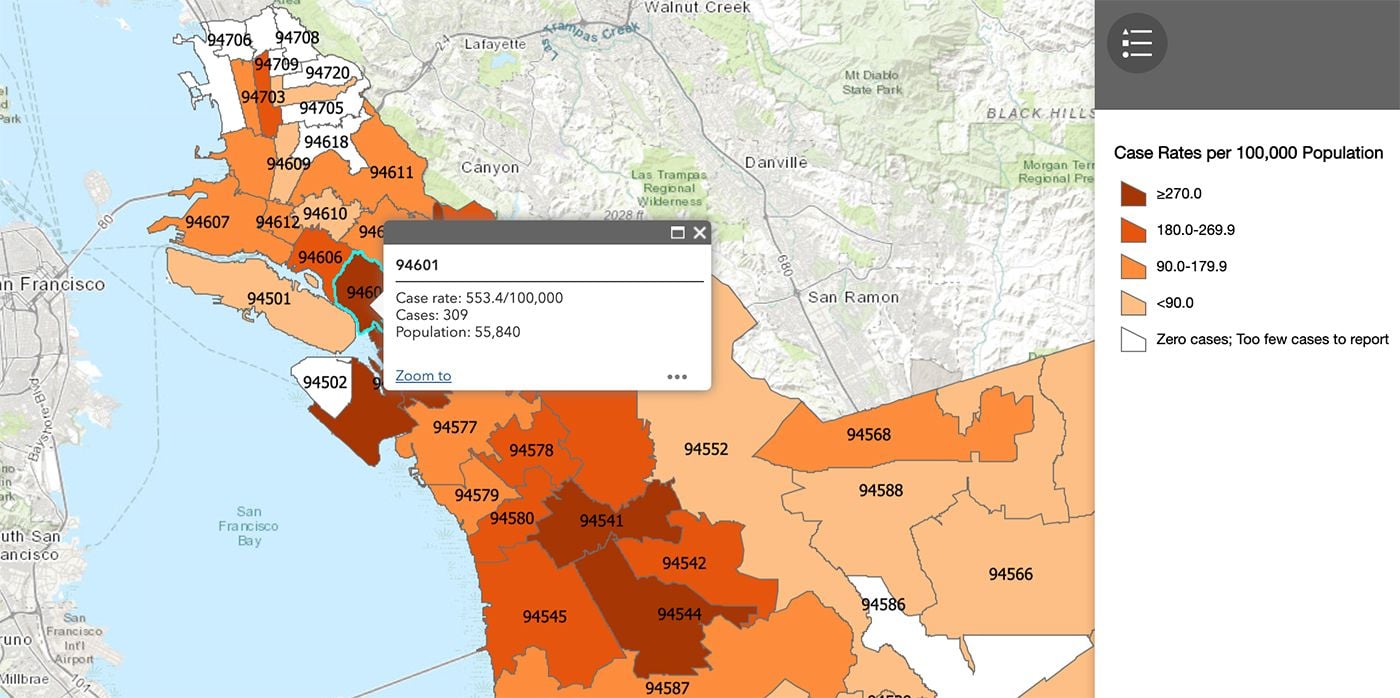The 94601 zip code in Oakland, which is home to the largely Latinx Fruitvale district as well as the Fairfax, Jefferson, Melrose, and Jingletown neighborhoods, now has one of the highest per capita rates of COVID-19 cases in the region. And today we learn that 12 workers at the Fruitvale location of Cardenas Markets have tested positive, bringing more worry to the neighborhood.
According to county data, there are now 309 confirmed cases of COVID-19 in the 94601 zip code, which equates to a rate of 553 per 100,000 residents. In several nearby zip codes in East Oakland, rates are between 300 and 500 per 100,000 residents, with the next highest being 94619, which is home to the Maxwell Park and Leona Heights neighborhoods, and where there are now 116 cases, or a rate of 462 cases per 100,000 residents.
The 94544 zip code in Hayward also has a case rate that is approaching 500 cases per 100,000 residents.

Similarly, in San Francisco, the Mission District's zip code, 94110, has a case rate of 511 per 100,000 residents (380 cases total), pointing to the ongoing disproportionate impact that the pandemic is having on Latinx communities around the Bay Area and beyond. The highest rate in San Francisco still belongs to the SoMa zip code, 94103, which has had 581 cases per 100,000 residents (a total of 158 cases to date in a population of around 27,000 people).
Alameda County has 3,195 cumulative confirmed cases of COVID-19 to date, with 98 new cases reported Friday morning. And as of last week, the county overtook Santa Clara County for the most cumulative cases in the region.
As the Mercury News reports, a dozen previously unreported cases have now been revealed among employees at Cardenas Markets at 1630 High Street in Oakland. The Mexican-focused market chain has reported multiple cases of COVID-19 among employees across California since March, when an employee at the chain's East San Jose location tested positive. But the 12 employees at the Fruitvale location seems to represent the largest outbreak to date.
"It’s alarming that we allow activity to continue when employees are testing positive," said district councilman Noel Gallo in a statement to the Mercury News. "If Cardenas is experiencing this, I’m sure other businesses are going through it too."
Cardenas Markets' Oakland store remained open this week after first reporting six COVID-positive employees to Gallo's office last week. The store has since undergone a deep clean by a third-party company, and a company spokesperson issued a statement saying, "“Our number one concern is the health and well-being of our team members and the communities we serve. We are doing everything we can to serve local residents and families to ensure their needs are met during this extraordinary crisis."
Marin County recently noted that a spike in coronavirus cases there was linked to a number of grocery store workers — and two grocery chains, United Markets and Mollie Stone's, subsequently both agreed to offer tests to all their employees.
Across the country, grocery store workers have been among the frontline workers bearing the brunt of the pandemic, forced to work in close proximity to a range of customers every day, some of whom could be infected and asymptomatic, and leaving behind aerosolized virus droplets in their wake when they're done shopping.
According to a Washington Post investigation, 5,500 grocery workers across the country have tested positive for COVID-19, and as of this week, 100 have died.
As a result, grocery chains are coming under fire from public health officials all over for not informing employees or the public when outbreaks occur, and not following proper testing, tracing, and quarantine procedures when their employees get sick. In recent interviews with 40 workers at 30 different grocery chains, the Post found allegations of "companies [that] had not disclosed cases of infected or dead workers, retaliated against employees who raised safety concerns, and used faulty equipment to implement coronavirus mitigation measures."
Related: Alameda County Overtakes Santa Clara For Most COVID Cases, Adds 280 Over Holiday Weekend

